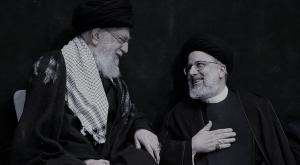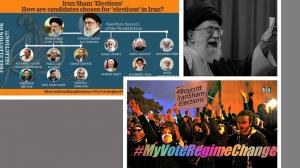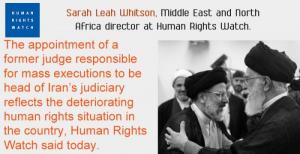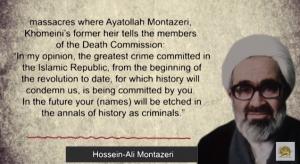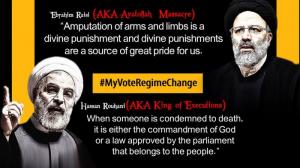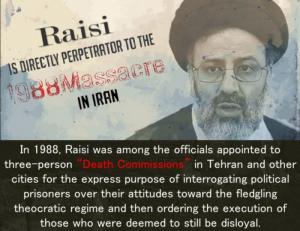
Ebrahim Raisi, a member of the 1988 Massacre’s “Death Commission” assigned as the highest judicial position within the regime.
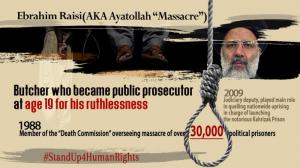
Ebrahim Raisi, a mass murderer of MEK activists and political prisoners appointed as head of the Iranian regime’s Judiciary.
Henchman of the 1988 massacre, murderer of MEK members and sympathizers and one of worst criminals against humanity
Ebrahim Raisi is the henchman of the 1988 massacre in which thousands of political prisoners were executed.”
PARIS, FRANCE, May 15, 2021 /EINPresswire.com/ -- The sham election presidential candidates, such as henchman Ebrahim Raisi, IRGC Brig. Ali Larijani, and Eshaq Jahangiri, have played a major role in murder and crimes against humanity, warmongering and war crimes, repression, censorship, terrorism, and plunder for the past 40 years.— NCRI
The candidates for the Iranian regime’s sham presidential election, such as henchman Ebrahim Raisi and IRGC Brig. Gen. Ali Larijani, Eshaq Jahangiri, and half a dozen Revolutionary Guards commanders have played a major role in murder and crimes against humanity, war mongering and war crimes, repression, censorship, terrorism, and plunder for the past 40 years.
Ebrahim Raisi, Khamenei's preferred candidate for the presidency of the ruling religious fascism, is the henchman of the 1988 massacre, murderer of the Mujahedin-e Khalq (MEK/PMOI), and one of the worst criminals against humanity.
Raisi was appointed as the Assistant Prosecutor of the Karaj Revolutionary Prosecutor's Office in 1980, at the age of 19. The following year, under the supervision of the cleric, Ali Quddusi, the regime’s Attorney General, Raisi was appointed as the Prosecutor of Karaj, and shortly thereafter as the prosecutor of Hamedan. In 1985, due to his active role in suppressing and killing the MEK members and supporters, he was appointed as the deputy to Ali Razini, the notorious Revolutionary Court Prosecutor in Tehran, and served as the director of division handling opposition groups.
In July 1988, at the age of 28, Raisi was appointed by Khomeini as a member of the death commission in Tehran which carried out the 1988 massacre of thousands of political prisoners based on Khomeini's fatwa. On August 15, 1988, Hossein Ali Montazeri, Khomeini's designated successor, summoned four members of the death commission in Tehran to his home in Qom. The audiotape of this meeting, which was released on August 9, 2016, reads: "It was the beginning of the month of Muharram (the first month of the Islamic calendar, which is one of the four sacred months of the year when warfare and killing are forbidden); I summoned Mr. (Hossein Ali) Nayyeri, (the sharia judge), Mr. (Morteza) Eshraghi, (the public prosecutor), Mr. (Ebrahim) Raisi (the then deputy prosecutor), and Mr. (Mostafa) Pourmohammadi, (representative of the Intelligence Ministry) and told them: "It’s now Muharram, at least stop the executions on Muharram"; Mr. Nayyeri said: "We have executed 750 people in Tehran so far, we have separated another 200 from the rest, who have refused to repent. Let’s finish them off and we will then do whatever you say." In this meeting, Mr. Montazeri stated: “The greatest crime in the Islamic Republic, for which history will condemn us, has been committed by you.”
After the massacre of political prisoners, Khomeini praised Ebrahim Raisi and gave him several assignments. Khomeini wrote in a decree on January 1, 1989, "As I have received numerous reports of judicial weakness, and the …people of Iran expect a more serious approach to various issues, your Excellency (Nayyeri) and Mr. Raisi will be given a judicial mission to review the reports of the cities from Semnan, Sirjan, Eslamabad, and Dorud. And regardless of administrative complications, carefully and quickly implement what is God's command in these cases (Quds Force News Agency, Tasnim - March 9, 2019).
Twenty days after the assignment was given to Raisi, Abdul-Karim Mousavi Ardebili, the then head of the regime’s Supreme Judicial Council, reporting on the results of the “judicial mission”, said: "sentences were issued in 24 hours. Four people were executed. Two hands were amputated, and three people were sent to prison." (Friday prayer, January 20, 1989).
In a letter to the Supreme Judicial Council on January 21, 1989, Khomeini wrote: “All the cases about which the council has surprisingly remained idle, delaying the implementation of God's judgment, must be given to Nayyeri and Raisi to carry out God's command as soon as possible. More delay is not allowed. I also strongly recommend Mr. Nayyeri and Mr. Raisi to fully observe the Sharia commands." (Khomeini’s portal)
In 2004, during Mahmoud Hashemi Shahroudi’s tenure as the Judiciary Chief, Raisi was appointed as his first deputy and the head of the General Inspection Organization. He held this position until 2014 during the first term of Sadegh Amoli Larijani as the Judiciary Chief. In 2014, he became the regime’s Attorney General. In March 2016, Khamenei appointed him as the custodian and chairman of Astan-e Quds Razavi, one of the regime's largest financial conglomerates and endowments with various holdings. Astan-e Quds Razavi is one of the main entities involved in astronomical looting and plundering of the Iranian people's wealth and resources. Khamenei appointed Raisi as the Judiciary Chief in March 2019.
In the aftermath of the 2009 uprisings in Iran, in an interview with state television on December 27, 2009, Raisi called all protesters as “Mohareb” (enemies of God) who deserve to be executed, "Moharebeh is a title for those who disrupt public security and frighten people. What happened on the day of Ashura (December 27, 2009) can be an example of Moharebeh. However, Moharebeh can be applied to an organization at any given time, like the hypocrites (pejorative name used by the regime for MEK). In the case of the organization of the Monafeqin (hypocrites), anyone who helps the organization of the Monafeqin in any way under any circumstances, because it is an organized movement, the title of Moharebeh applies.”
According to the Mehr news agency, on June 9, 2020, Raisi said, “One day I went to see Khomeini with three or four friends to present a report on some of these files. When we came out, we felt that ... the Imam is more radical than us. We went to say that we are doing these things ... (and were worried that) the Imam may say that we are overdoing it. We saw that the Imam was many steps ahead of us, and not only encouraged us but also said that you should follow this work more seriously, not only in Tehran but also in other provinces." (Mehr News Agency, June 10, 2016)
The US and the EU have sanctioned Raisi for his role in executions, human rights abuses, and the massacre of political prisoners.
By bringing Raisi to power and closing ranks, Khamenei seeks to overcome the crisis of overthrow which has engulfed his regime and confront increasing popular uprisings.
Secretariat of the National Council of Resistance of Iran (NCRI)
May 15, 2021
Shahin Gobadi
NCRI
+33 6 50 11 98 48
email us here
Visit us on social media:
Twitter
Ebrahim Raisi, the untold story of the 1988 Massacre in Iran














